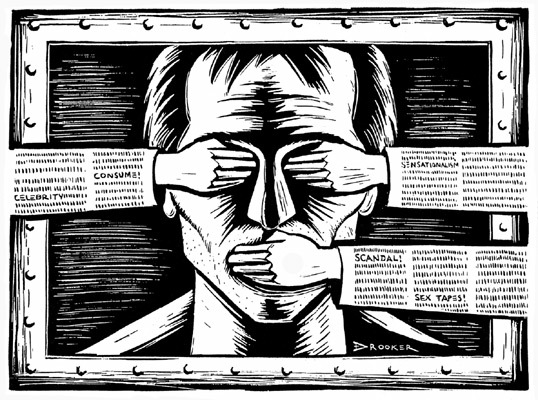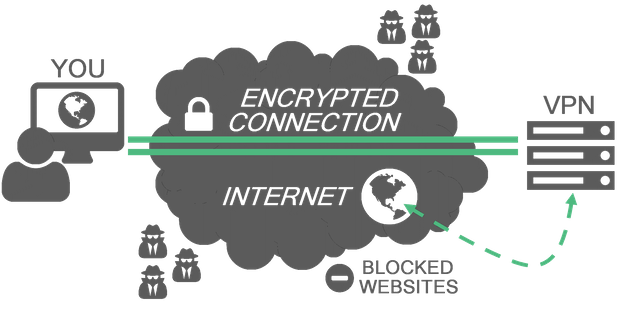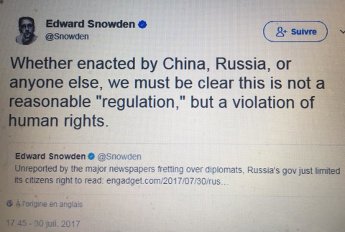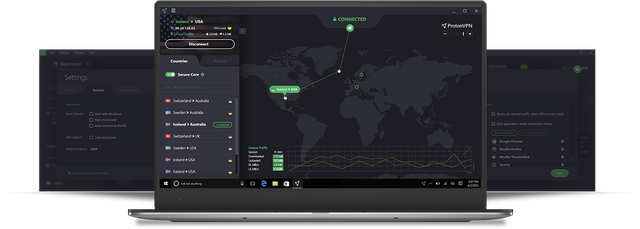Are anti-VPN and proxies laws contrary to human rights?
VPN, Virtual Privat Network

China and Russia have just adopted in recent month draconian new measures against VPNs, these virtual private networks that bypass Internet censorship.
According to Edward Snowden, the banning of VPNs which has just been imposed by the vote of a law of 30 July 2017 in Russia and their very close control in China would, according to the American whistleblower who is still exiled in Moscow since his revelations about the mass surveillance of the United States in 2013, constitute a real "human rights violation".
China has in fact just obtained from Apple that the apple brand removes from the VPN applications of its Chinese applestore, while the Russian Duma adopted on July 30 last a law prohibiting the use of VPNs as of November 1,2017.
Remember that a VPN connection offers secure access to the Internet by creating a kind of "digital tunnel" and makes you almost anonymous thanks to the use of an IP that is not your home's IP, but that of the VPN provider.
These VPNs have been illegal in China since January 2017, and government approval is now required to offer them to the public. Restrictive measures on the web have been multiplying for several months now, notably with the blocking of WhatsApp and the submission to a giant firewall "the great wall" allowing the filtering of sensitive information.
The CEO of Apple Tim Cook said on August 1 that he would have preferred not to have to withdraw the applications'' but, as we do in other countries, we observe the law where we do business and we believe that being present in those markets by bringing benefits to customers is in the best interests of people there and in other countries as well," he said.
"We hope that over time the restrictions imposed will be relaxed because innovation needs the freedom to collaborate and communicate and I know it is very important there," he added.

The Russian government's telecommunications monitoring agency, Roskomnadzor, is proving to be very effective in blocking unpleasant Internet content. On 28 July 2017, it announced to the Russian news agency Tass that it had already blocked more than 275,000 illegal URLs in the last five years (i. e. 150 days), including sites of cybercrime or pornography, but also LinkedIn and Dailymotion.
Edward Snowden has thus resumed his acerbic pen and denounced on Twitter on 30 July 2017 that it is not '' reasonable regulation'' but a violation of human rights''.

Having a VPN connection is quite legal in France and it is notably used to try to circumvent the geographical filtering of certain content, most often videos or films, protected locally by copyright (and therefore a use potentially infringing the provisions of article L335-3-1 of the Intellectual Property Code)
However, Internet access is a fundamental right recognized by the United Nations since 2012. But in the face of increasing violations of this right, the UN Human Rights Council was forced to raise its voice in 2016.
For example, a resolution was adopted on 15 July 2016 to formally condemn Internet access restrictions and condemns"unequivocally measures aimed at preventing or deliberately disrupting access to or dissemination of information or online information in violation of international human rights law" and "calls on all States to refrain from such practices and to put an end to them".
In other words, according to the United Nations, preventing or restricting access to information disseminated online is, according to the international organization, a violation of human rights.
Several UN countries had tried to block the text, including Saudi Arabia, South Africa and India, but above all... Russia and China.
source :
- http://www.francesoir.fr/actualites-economie-finances/le-pdg-dapple-regrette-davoir-du-supprimer-certains-vpn-en-chine?platform=hootsuite
- http://www.thierryvallatavocat.com/2016/07/onu-les-restrictions-de-l-acces-a-l-information-sur-internet-sont-contraires-aux-droits-de-l-homme.html
- http://publication.pravo.gov.ru/Document/View/0001201707300002?index=0&rangeSize=1
- http://www.ohchr.org/FR/NewsEvents/Pages/DisplayNews.aspx?NewsID=20223&LangID=F
ProtonVPN

I personally use https://protonvpn.com/
I highly recommend it to you
@oguste